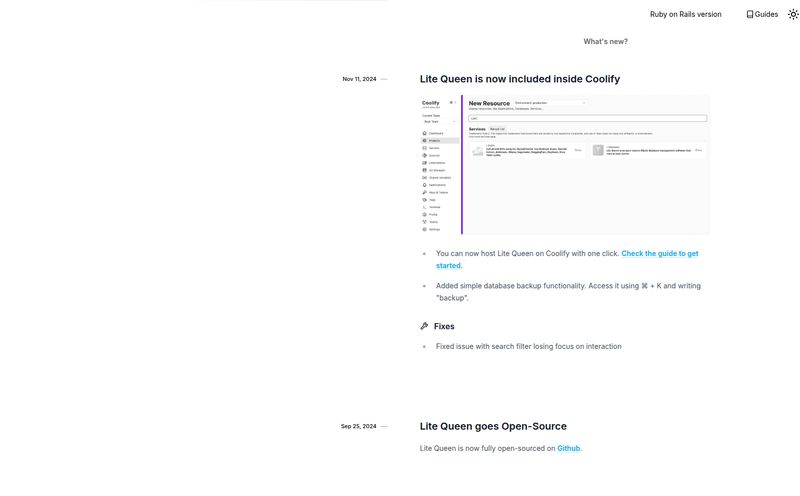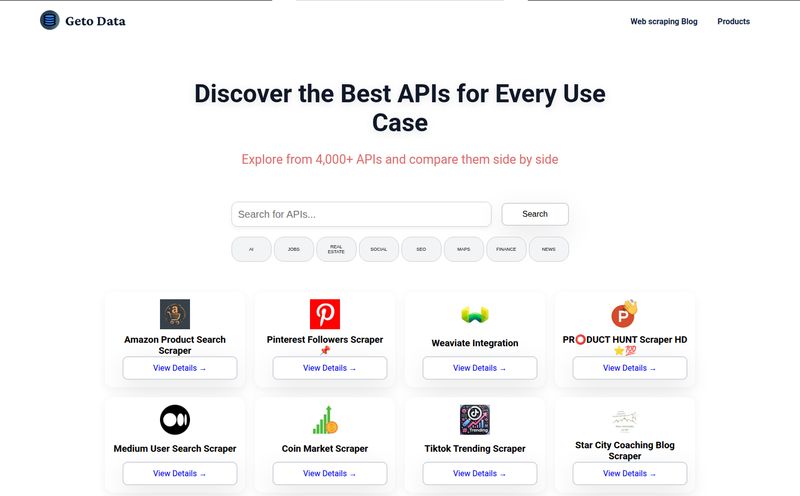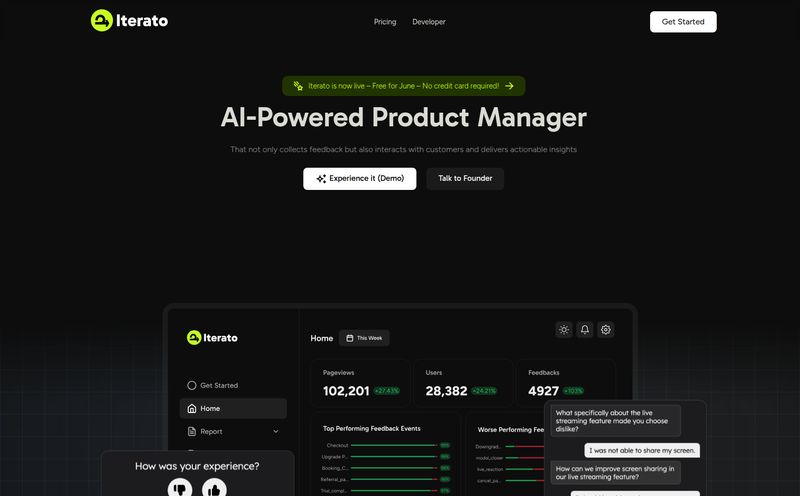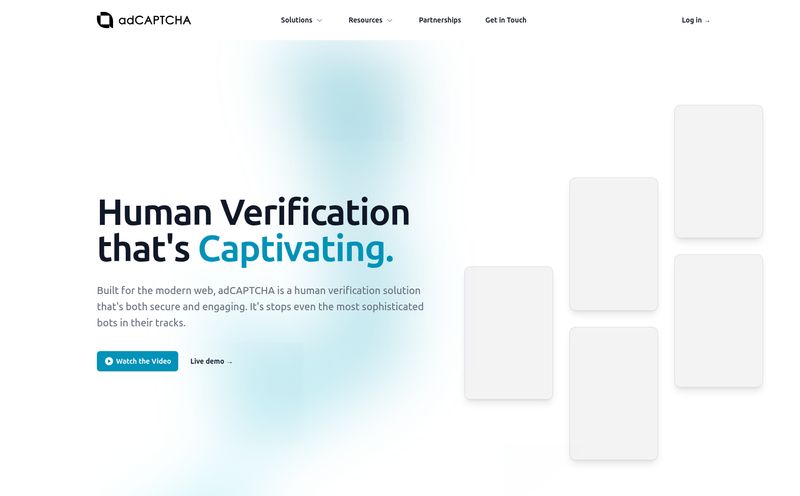If you're a content creator, a marketer, or anyone who's ever had to source music for a project, you know the pain. You spend hours scrolling through stale, overused stock music libraries, trying to find a track that doesn't sound like it belongs in a 1980s corporate training video. Or worse, you find the perfect song on YouTube, use it, and then BAM. The dreaded copyright claim arrives. It's a traffic-generation nightmare.
I’ve been in the SEO and content game for years, and the music problem has always been a thorn in my side. Then came the AI explosion. Suddenly, we had AI that could write, AI that could paint... and now, AI that can compose. I've been cautiously optimistic, but also a little wary. The legalities felt... murky. But then I stumbled upon a platform called Loudly, and my curiosity was definitely piqued.
They’re not just another AI music generator. Their big, bold claim? They’ve built an ethical AI. That’s a term that gets my attention.
So, What Exactly is Loudly?
At its core, Loudly is an AI-powered music platform designed to be an all-in-one solution for creators. Think of it less like a static library and more like a creative partner. It's a place where you can generate completely new, unique music from scratch, customize existing tracks until they're perfect, and even distribute your creations to major streaming platforms. It’s a pretty ambitious goal, aiming to serve everyone from YouTubers needing background music to indie artists wanting to produce an entire album.
The platform combines several tools under one roof: a text-to-music generator, a massive catalog of pre-made (but customizable) royalty-free tracks, a remixing studio, and even a distribution service. It's a whole ecosystem.
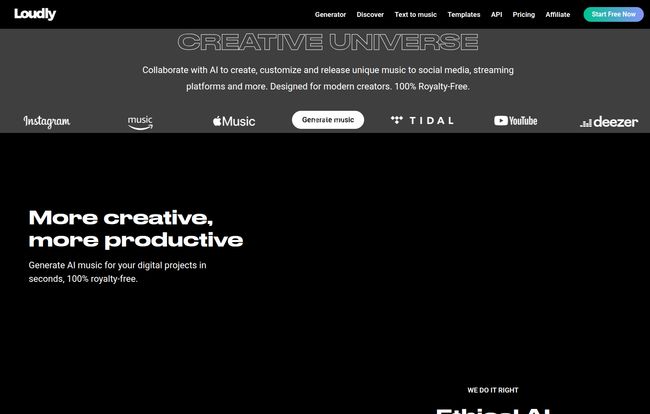
Visit Loudly
The Elephant in the Room: Why Ethical AI Music is a Game Changer
Okay, let's talk about that “Ethical AI” badge. This isn’t just marketing fluff. In a world where AI models are often trained on copyrighted material without permission, creating a massive legal and ethical gray area, Loudly’s approach is a breath of fresh air. They state their AI is trained on a fully-licensed and owned catalog, meaning they have the rights to the data their AI learned from.
Why does this matter so much? Because it means the music you generate is, in theory, completely clean. You own the license, and you don’t have to lie awake at night wondering if your podcast intro is going to get your entire channel demonetized. For anyone who’s built a brand on platforms like YouTube or Twitch, that peace of mind is invaluable. It removes the single biggest fear associated with using AI-generated creative assets. I've seen channels get hit with copyright strikes for using music they thought was safe, and it can be devastating to their traffic and revenue. This feels like a genuine solution.
A Look Under the Hood at Loudly’s Features
So it's ethical, great. But is it any good? A tool can have the best intentions in the world, but if it's clunky or the output is subpar, it's useless. I spent some time tinkering with the platform, and here's what stood out.
From Simple Prompts to Full Tracks
The Text-to-Music feature is probably the flashiest part of the package. You type in a prompt like, “upbeat acoustic folk for a travel vlog, with a driving beat,” and the AI gets to work. It’s kinda magical watching it spin up a track in seconds. The results can be a bit of a mixed bag, as with any generative AI, but it's a fantastic starting point. Where it gets really powerful is when you combine this with their other features. You can generate a core idea and then take it into the studio.
More Than a Vending Machine for Music
This is what really separates Loudly from simpler tools. You aren't just stuck with what the AI spits out. With their Studio Remixing tools, you can dive into a track and tweak it. You can change the instrumentation, adjust the energy, or even upload your own audio clips to integrate into the song.
Even better, you can generate music stems—the individual instrumental tracks (drums, bass, synth, etc.). For anyone with even basic audio editing skills, this is huge. It's like instead of getting a finished cake, you get all the ingredients perfectly measured out, and you can decide if you want to add more frosting. This level of customization ensures the music truly fits your project and doesn’t sound like something anyone else could generate with the same prompt.
Getting Your Music Out There
And here’s a feature I did not expect: Music Distribution. With the paid plans, you can actually release the music you create on Loudly to Spotify, Apple Music, TikTok, and over 40 other platforms. This is wild. It transforms Loudly from a B2B tool for creators into a potential launchpad for aspiring musicians. You could concievably create and release an entire EP without ever touching a traditional instrument or DAW if you wanted to.
Let's Talk Money: A Breakdown of Loudly's Pricing
Alright, the all-important question: what's this going to cost? Loudly operates on a freemium model, which I always appreciate. It lets you test the waters before committing.
| Plan | Price | Best For | Key Features |
|---|---|---|---|
| Free | $0 /month | Hobbyists & testing the platform | Limited creations, 30-sec previews, 1 download/day, non-commercial use only. |
| Personal | $8 /month (billed annually) | Content creators, YouTubers, small businesses | 900 tracks/year, full commercial license, MP3/WAV downloads, fast generation. |
| Pro | $24 /month (billed annually) | Power users, agencies, music producers | 3000 tracks/year, 30-min song length, more downloads, more stems, music distribution. |
My take? The Free plan is perfect for getting a feel for the interface and generation quality. But the non-commercial license is a hard stop for any serious work. The Personal plan at $96 a year is the sweet spot for the vast majority of creators. It gives you high-quality audio and the commercial license you need for peace of mind. The Pro plan is for those who are either creating a massive volume of content or are serious about using Loudly for actual music production and distribution.
The Good, The Bad, and The Realistic
No tool is perfect, so let's cut to the chase. What I really like about Loudly is the user-friendly interface and the sheer breadth of features. The combination of generation, customization, and distribution in one place is seriously impressive. And I can't say it enough, the ethical AI approach is a massive plus.
On the flip side, the limitations on the free and lower-tiered plans are something to be aware of. The number of downloads, stem packs, and track creations are capped, so you need to choose the plan that aligns with your output. And, like all current AI, it's not a magic wand. You'll still need a good ear and a bit of creative direction to guide the AI toward a truly great track. Don't expect to type "make a hit song" and get a Grammy-winner back. It’s a tool to augment creativity, not replace it entirely.
Frequently Asked Questions About Loudly
- Is music from Loudly really royalty-free?
- Yes, with a paid subscription. The license you get covers commercial use on social media, websites, and ads without owing any future royalties. The key is to have an active subscription for the content you publish.
- Can I use Loudly music on my YouTube channel?
- Absolutely. That's one of its primary use cases. The Personal and Pro plans provide the necessary commercial license to monetize your videos without worrying about copyright claims.
- How good is the text-to-music AI?
- It's surprisingly capable and a great way to generate ideas quickly. For the best results, you'll want to use it as a starting point and then use the Studio features to refine the track to your exact needs. It's more of a creative collaborator than a one-click-solution.
- What happens if I cancel my subscription?
- According to their terms, any content you published while your subscription was active remains licensed forever. You just can't use Loudly's music in any new projects after your subscription ends.
- How is Loudly's AI trained ethically?
- Loudly states that its AI is trained on a music catalog that it owns and has fully licensed from artists and producers. This means they are not scraping copyrighted material from the web, which protects both them and their users from legal issues.
The Final Verdict: Is Loudly Worth It?
After spending some quality time with the platform, I'm genuinely impressed. Loudly feels like a mature, well-thought-out tool in a field that's still very new and chaotic. It strikes a fantastic balance between powerful AI generation and hands-on creative control.
Is it for everyone? If you just need one song once a year, probably not. But for content creators, social media managers, podcasters, and indie producers who constantly need a supply of fresh, high-quality, and legally safe music, Loudly is a very compelling answer. It solves a real, persistent problem, and does it with an ethical foundation that lets you create with confidence.
It’s not just a tool for avoiding copyright strikes; it’s a platform that could genuinely speed up your workflow and elevate the quality of your content. And in the never-ending battle for audience attention, that's a powerful ally to have in your corner.
